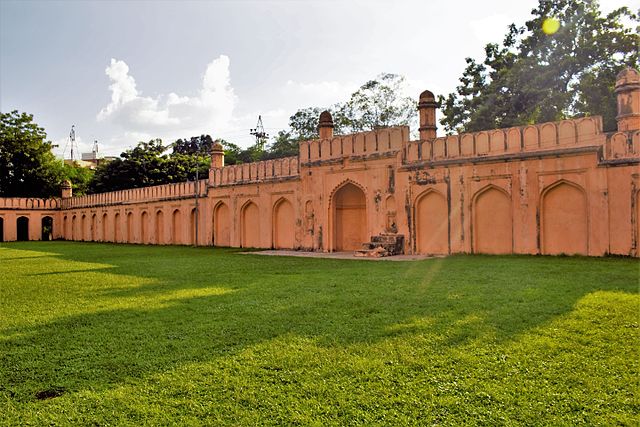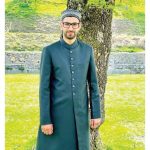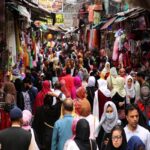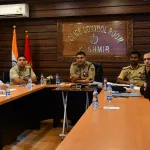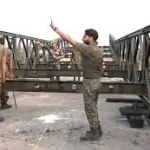For 364 days a year, they lie forgotten – vast open fields where children play cricket and sheep graze lazily. But on the morning of Eid, these same grounds transform into Kashmir’s most sacred spaces, filled with thousands of white-robed worshipers united in prayer. This is the annual transformation of Kashmir’s Eidgahs, where faith come alive in one glorious morning.
In every town and neighborhood across the valley, these Eidgahs sit quiet waiting for their moment. “You wouldn’t notice them most days,” says Reyaz Ahmad, a local in Bandipora. “But when Eid comes, Eidgahs become the center of our world.” The story of how these ordinary fields prepare to host Kashmir’s most important congregational prayers is one of community spirit, planning, and generations-old traditions.
Days before Eid, the quiet fields begin stirring to life. Volunteers arrive carrying brooms, buckets and wheelbarrows. Among them is 43-year-old Mohd Shafi Najar, who has been helping prepare the Gundpora Bandipora Eidgah for 15 years years. “We start three days early,” he says, sweeping away dried leaves. “First we clear every stone, every piece of litter. Then we level the ground perfectly.”
The preparations follow traditions passed down through generations. Young men arrive with shovels to fill any uneven patches. Others bring water to settle the dust. “It’s not just cleaning,” explains university student Arish Ayaz. “We’re preparing sacred ground where thousands will stand before God.”
One of the biggest challenges is Kashmir’s famous morning dew. On Eid day, men and boys wear their finest white traditional attire (khandress) – traditional robes that must remain spotless. “The grass is always wet at dawn,” says volunteer Nadeem Ahmad. “If we don’t prepare properly, everyone’s clothes will be soaked.” The solution? Layers of borrowed carpets and prayer mats that transform the entire field into a dry, clean surface. Many people bring their own small prayer mats when they come for prayers.
The night before Eid is when the real magic happens. Under the glow of temporary floodlights, dozens of volunteers work tirelessly. Some kneel to arrange carpets edge-to-edge. Others set up loudspeakers for the imam. Elderly volunteers inspect every inch, smoothing wrinkles in the fabric. “We treat it like preparing a king’s palace,” laughs 70-year-old Mohammad Abdullah Bhat, who remembers helping his father do the same work decades ago.
As dawn breaks on Eid morning, the transformation is complete. What was an empty field now shimmers with row upon row of pristine white carpets. The first worshippers arrive, their fresh attire glowing in the morning light. By sunrise, the Eidgah is a sea of white – thousands standing shoulder to shoulder, rich and poor alike.
The air fills with the powerful chorus of “Allahu Akbar” as the prayer begins. For longtime residents like Abdul Aziz, this moment never loses its wonder. “I’ve prayed here every Eid for 50 years,” he says, tears in his eyes. “That first takbeer, when thousands of voices become one – it reminds me what Kashmir truly is.”
After prayers, the Eidgah becomes a ground of festivities. Children in new clothes chase each other between prayer lines. Families reunite after long separations. Photographers capture generations standing together. The aroma of freshly cooked wazwan drifts from nearby homes.
By afternoon, the carpets are rolled up, the loudspeakers packed away. The volunteers return for one final cleanup. As the last trash bag is tied, the Eidgah begins its long wait until next year. But the memories linger – of a community that came together, of faith made visible, of an ordinary field that became, for one perfect morning, the center of the universe.
For local Mushtaq Ahmad, the Eidgah represents something deeper than just a prayer space. “In our history of conflicts and divisions, the Eidgah remains untouched,” he explains. “For one day, all differences vanish. The doctor stands with the laborer. The young stand with the old. That unity is the true spirit of Eid.”
As the sun sets on another Eid, the fields return to their quiet existence. Children will resume their cricket games tomorrow. The grass will grow until next eid preparations begin again. But for thousands who gathered there at dawn, the memory of that perfect morning – when an empty field became a sacred space – will sustain them until the next Eid comes around.


